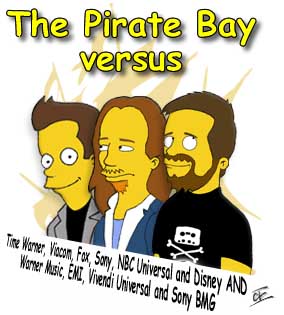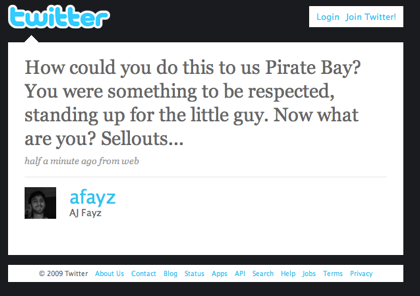Comment So The Pirate Bay has executed the Web 2.0 business plan to perfection: give someone else's stuff away for free - then find a bigger idiot to buy the company.
It's actually not so different from the potted history of every media company that rises to popularity on the back of a new medium - take radio, for example - then sells out at the top of the market. Only in the case of Web 2.0, companies go from "pre-revenue" to "post-revenue" without any revenue in between. That's where you need a bigger idiot.
It's cute to read arguments today that depend so much on historical inevitability - or else rely on natural, or physical "laws" - laws which turn out to be dodgy metaphors that only exist in the author's head. When we look at history, we learn something quite different, which is that all media companies reach a settlement with creators, eventually. The two are mutually symbiotic: copyright is a social agreement created in response to technological innovation, and technology needs copyright material, or else it's bunch of empty pipes, or at best a low-value telephone network.
Occasionally, history throws up odd wrinkles, such as the absence of a performance rights deal on sound recordings on US radio, but these are very rare exceptions. In the absence of a viable business, the hope of New Media startups has been to find a wrinkle they can drive a bus (or a business) through. The original Napster hoped to change the law, and when that failed, it tried to reach a settlement with the record industry.
(And speaking of odd wrinkles, that's what the techno-utopian law professor Charlie Nesson is trying to do in the Tenenbaum defence against the record labels - make all downloads "fair use". See The Bootnote).

If Nesson's entertaining but doomed legal defence looks like the end of an era, so too does Pirate Bay's exit strategy. Throw in the mauling handed out to Chris "Free" Anderson's piece of derivative juvenilia, and it looks like one early phase of internet exuberance is over.
Why a legal Pirate Bay will fail
The allure of Pirate Bay was simple: it had pretty much all the world's most popular digital stuff for free. Take away the stuff, or take away the "free", and it must enter the same rough marketplace as every other digital media company.

A heartbroken user
A fellow Swede Daniel Ek of Spotify has similar ambitions - to create the world's freely accessible jukebox (and perhaps in the future Video on Demand library), also using P2P. He was asked last week why he'd bothered.
Because it's a challenge, Ek replied - it's easy to do an unlicensed service, but it's hard to do a legitimate service. By comparison, no one could confuse hosting a Torrent tracker with technological innovation; Bram Cohen, you'll recall (unless you're a Guardian blogger), wrote Bittorrent, and countless of others created the internet infrastructure. Recall that the original Napster at least achieved the feat of creating, in record time, the world's most-used server cluster.
Pirate Bay offered nothing to potential buyers except the domain name, apart from a beta streaming-server, one of hundreds. It developed no new technology, or any new way of enjoying media. The internet cafe company which acquired it obviously thinks so too, which is why it announced a separate acquisition of some P2P technology developed in academia to provide the secret sauce necessary to attract investors and rights holder.
So instead, Pirate Bay turned to ideology, and tried to conjure up a political movement. At a time when politicians have given up the vision thing, and treat the public with contempt, it was seeking fertile ground.
But Pirate Bay's decision to use ideology as a fig-leaf to cover up its lack of real innovation leaves its new owners with very little to work with. The politics counts against it, as soon as the freebies disappear. As I write, the Torrents are being purged from Pirate Bay. There's no reason to stick around.
As we reported earlier today, the group's spokesperson Peter Sunde is grumpy at what he calls ungrateful freeloaders - the irony! - but that's too bad. The team have nobody to blame but themselves.
Now imagine if the licensed service Spotify closed its "free" portion tonight. I don't doubt it would get thousands of tenner-a-month subscriptions flooding in - it offers something people quite like. Yet one Torrent tracker is substitutable for another. The precedent of Vuze isn't promising. Vuze tried the legal route, signed agreements with Hollywood to deliver pay-per-view, and resorted to indexing unlicensed Torrent trackers. Last month it opened an HD pay-per-view porn channel.
I guess porn is one of Sweden's most successful exports, so there's hope.
